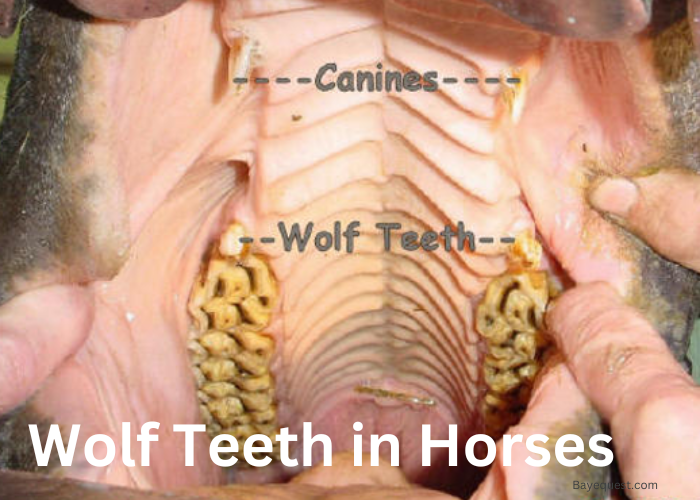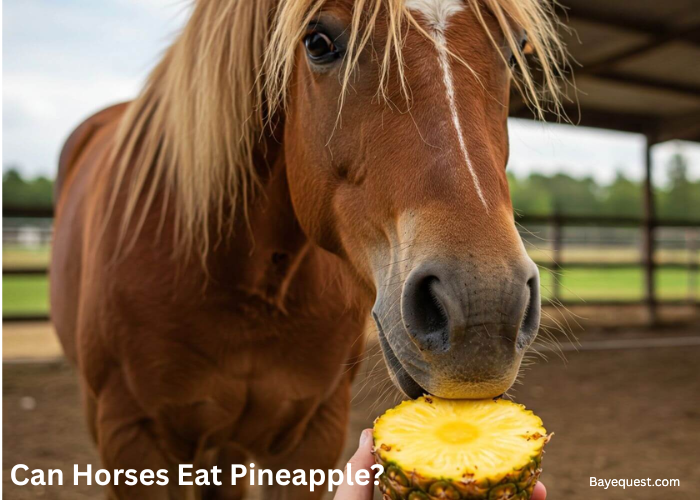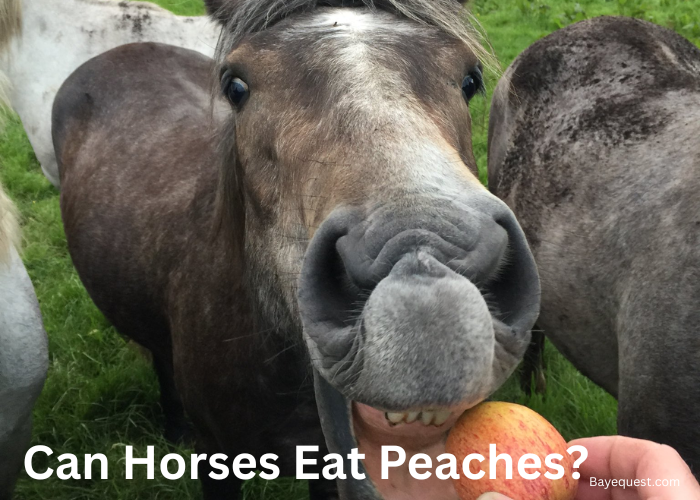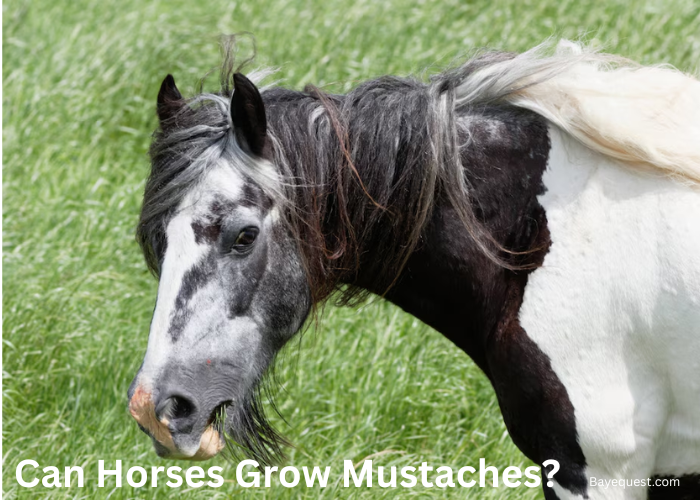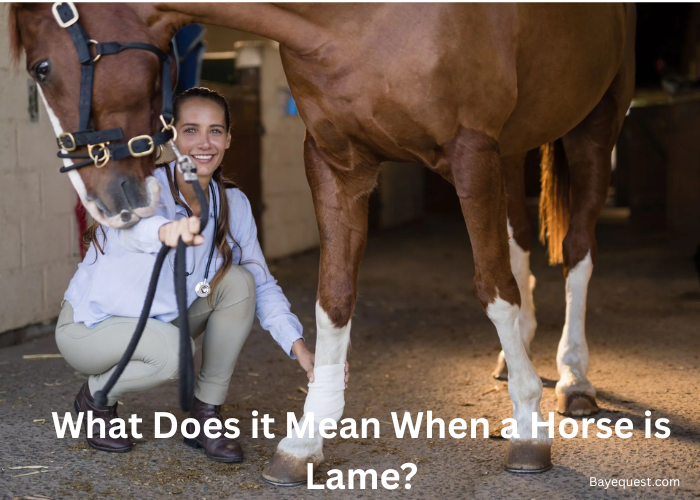Horse teeth are fascinating, but wolf teeth often go unnoticed until they cause trouble. These small, seemingly insignificant teeth can create big challenges for horses.
So, what are they, and why do they matter? Let’s explore the world of wolf teeth.
We’ll explain what they are, why some horses have them, and what to do if they cause issues.
Get ready to dive into an interesting dental journey.
What Are Wolf Teeth in Horses? Key Takeaway
Wolf teeth in horses are small, first premolar teeth usually found in the upper jaw. They can sometimes develop in the lower jaw or only on one side. Some wolf teeth remain beneath the gum surface, called “blind” wolf teeth. Regular dental check-ups help manage any issues they cause.
Anatomy of Wolf Teeth (What Do Wolf Teeth Look Like?)
Wolf teeth in horses are small, vestigial teeth that usually appear in the upper jaw, just in front of the first molars.
These teeth are small, about 1-2 centimeters long, and pointed. Their shape can vary, with some being rounded and others more conical.
Wolf teeth are most often found in the upper jaw (maxilla), but they can occasionally appear in the lower jaw (mandible). They might be present on both sides of the mouth or just one.
Wolf teeth have relatively short roots compared to other teeth, making them easier to extract if necessary. However, their root positioning can sometimes cause discomfort, especially if it interferes with the bit.
Wolf teeth usually emerge when a horse is between 6 and 18 months old. However, not all horses develop wolf teeth.
Some might never have them, while others could have one, two, or more.
These teeth are considered vestigial, meaning they no longer serve a significant purpose in the horse’s current anatomy. They are believed to be remnants from evolutionary ancestors with a different diet requiring more teeth.
Read also: Anatomy of the Horse Leg.
How to Identify Wolf Teeth
Identifying wolf teeth in horses is pretty straightforward.
Start by looking in the upper jaw, right in front of the first molars. These teeth are small and pointed, easy to spot if you know where to look.
You might notice some signs that your horse has wolf teeth. If your horse has trouble with the bit, it could be due to these little teeth. They might cause discomfort, making your horse fussy or resistant when you ride.
To check for wolf teeth, gently lift your horse’s lips and look along the gum line. You can often see them poking out.
If you’re not sure, ask your vet. They can confirm if your horse has wolf teeth and advise what to do next. Regular dental check-ups are a good idea, too, to keep an eye on any potential issues.
When Do Horses Get Wolf Teeth?
Wolf teeth in horses develop early in their life. They usually start to appear when the horse is between 6 and 18 months old.
These teeth are small and often hidden just in front of the first molars in the upper jaw. Sometimes, they can also appear in the lower jaw, but that’s less common.
Not every horse will develop wolf teeth. Some might have one, two, or more, while others may not have any at all. The appearance of wolf teeth can vary, but they are generally small and pointed.
Since wolf teeth don’t serve a significant purpose, they are considered vestigial. This means they are remnants of ancient horse ancestors who had a different diet and needed more teeth.
As horses evolved, these teeth lost their primary function but still occasionally appear in modern horses.
Why Do Horses Have Wolf Teeth?
Horses have wolf teeth because they are evolutionary leftovers. These small teeth are remnants from ancient horse ancestors who had a different diet and needed more teeth to help with chewing.
Wolf teeth are considered vestigial, meaning they no longer serve a significant purpose in modern horses. While they might not be needed now, they occasionally appear in the mouth.
They are usually located just in front of the first molars in the upper jaw, though they can sometimes be found in the lower jaw as well.
Even though they don’t serve much purpose today, it’s important to be aware of them.
The Connection of Wolf Teeth and Equine Pain
Wolf teeth can be a source of pain for horses. These small teeth, found just before the first molars, can cause problems, especially when a bit is used.
The bit can press against the wolf teeth, leading to discomfort and pain.
When a horse feels pain from wolf teeth, you might notice changes in behavior. They could become fussy, resistant, or difficult to handle, especially when you’re riding.
This pain can make them toss their head, chew the bit excessively, or show other signs of distress.
If you suspect your horse is in pain because of wolf teeth, get a vet to check them out. The vet can confirm if the wolf teeth are the problem and recommend removal.
This simple procedure can greatly improve your horse’s comfort and performance.
The Evolutionary Purpose of Wolf Teeth
Wolf teeth in horses are remnants from when their ancestors had a different diet and lifestyle.
These small teeth, often found just in front of the first molars, once served a useful purpose. Ancient horses needed more teeth to help grind down tough, fibrous plants.
Over millions of years, as horses evolved and their diet changed, the need for these extra teeth decreased. Modern horses eat a diet that doesn’t require as much heavy grinding.
So, wolf teeth became less important and started to disappear in many horses. But they haven’t completely gone away.
Today, wolf teeth don’t serve any significant function. They are considered vestigial, meaning they are evolutionary leftovers.
While they don’t play a role in chewing anymore, understanding their past helps us know why they exist and how to manage them in our horses.
Mystery of Blind Wolf Teeth
Blind wolf teeth are a bit of a mystery.
Unlike regular wolf teeth, which you can see, blind wolf teeth are hidden under the gum. They don’t break through the surface but can cause problems.
These hidden teeth can cause pain by pressing against the gums and other teeth.
Your horse might show discomfort, like being fussy with the bit or having trouble eating. It’s tricky because you can’t see these teeth just by looking in your horse’s mouth.
A vet can help identify blind wolf teeth. They might use special tools or X-rays to find these hidden troublemakers.
Once identified, the vet can remove them to relieve your horse’s discomfort.
The Role of Wolf Teeth in Horse’s Diet
Wolf teeth don’t play a role in a horse’s diet today. They are small, vestigial teeth left over from ancient times.
Back then, horses needed these extra teeth to help grind down tough plants and fibrous food. Over time, as horses’ diets changed, the need for these teeth disappeared.
Modern horses eat different foods that don’t require the same heavy grinding. That’s why wolf teeth aren’t needed now.
They don’t help with chewing or eating. Instead, they can sometimes cause problems, especially when using a bit.
How Wolf Teeth Can Affect a Horse’s Behavior
Wolf teeth can affect a horse’s behavior. These small teeth, especially when they cause pain, can make your horse act out.
You might notice your horse being fussy or difficult when you use a bit. They might toss their head, chew the bit excessively, or resist commands.
Pain from wolf teeth can make a horse seem stubborn or even aggressive. They’re not trying to be difficult; they’re just reacting to the discomfort.
This can make training and riding frustrating for both you and your horse. If you see these behavior changes, have a vet check for wolf teeth.
Do Wolf Teeth Need to be Removed?
Yes, wolf teeth sometimes need to be removed.
If they aren’t causing any problems, you can leave them alone. But removal might be necessary if your horse is having issues with the bit or showing signs of discomfort.
When wolf teeth press against the bit, they can cause pain and make your horse fussy or resistant. Removing these teeth can bring relief and improve your horse’s behavior.
A vet can examine your horse and decide if removal is the best option. It’s a simple procedure that can make a big difference in your horse’s comfort and performance.
Importance of Wolf Teeth Removal in Horses
Extracting wolf teeth in horses is important for several reasons.
First, it helps eliminate pain. These small teeth can press against the bit, causing discomfort and making your horse fussy or resistant during rides.
Removing wolf teeth can also improve your horse’s behavior. When not in pain, horses are more cooperative and easier to handle. This makes training and riding much smoother.
Additionally, extraction prevents potential dental issues. Left unchecked, wolf teeth can cause other problems in the mouth. Regular dental check-ups and timely extraction keep your horse’s mouth healthy.
Overall, extracting wolf teeth when needed ensures your horse stays comfortable happy, and performs their best.
How to Extract Wolf Teeth
Extracting wolf teeth from horses is a straightforward process, but it should always be done by a vet. Here’s how it goes:
First, the vet will sedate your horse to keep it calm and still. This ensures the procedure is safe for both the horse and the vet.
Once your horse is relaxed, the vet will use a special tool to lift the gums around the wolf tooth.
Next, the vet will carefully loosen the tooth. This part requires skill to avoid damaging surrounding teeth or tissues. Once the tooth is loose enough, the vet will gently pull it out.
After the extraction, the vet will check the area to make sure everything looks good and there are no leftover tooth fragments.
They might also provide aftercare instructions, like rinsing the mouth or relieving pain.
The whole process is quick and simple. With proper care, your horse will recover swiftly and feel much more comfortable without those pesky wolf teeth.
Preventive Measures for Issues Related With Wolf Teeth
Preventing issues with wolf teeth in horses is all about regular care and attention. Here are some key steps:
Regular dental check-ups are crucial. Having a vet check your horse’s teeth can catch wolf teeth early before they cause problems.
Watch for signs of discomfort. If your horse is fussy with the bit, tossing its head, or showing other signs of pain, it might be time for a dental exam.
Use a well-fitted bit and bridle. Ensuring your tack fits properly can help reduce pressure on any wolf teeth and minimize discomfort.
Start dental care early. Getting your young horse used to dental exams can make it easier to manage their teeth as they grow.
Consult your vet if you have concerns. They can advise on whether wolf teeth must be removed or how to manage them.
By staying proactive, you can help keep your horse comfortable and happy and avoid issues with wolf teeth before they start.
Myths and Misconceptions of Wolf Teeth
1. All horses have wolf teeth. Not all horses develop wolf teeth. Some may never have them, while others might have one, two, or more.
2. Wolf teeth always cause problems. Wolf teeth don’t always cause issues. Many horses live comfortably with wolf teeth without any discomfort.
3. Wolf teeth are the same as canine teeth. Wolf teeth and canine teeth are different. Canine teeth are larger and located further back in the mouth, while wolf teeth are small and found just in front of the first molars.
4. Wolf teeth must be removed. Not all wolf teeth need to be extracted. If they aren’t causing any problems, they can be left alone.
5. Removing wolf teeth is risky. Extracting wolf teeth is a common and relatively simple procedure for a vet. It’s not particularly risky when done properly.
6. Wolf teeth affect all horses equally. The impact of wolf teeth varies from horse to horse. Some may experience significant discomfort, while others may not be affected at all.
Interesting read: Do Horse Teeth Keep Growing?
FAQs
Does the breed of horse influence the development of wolf teeth?
No, the breed of a horse does not influence the development of wolf teeth. Wolf teeth can appear in any breed, though not all horses will have them.
Can the presence of wolf teeth affect the general health of a horse?
The presence of wolf teeth can affect a horse’s comfort, especially when using a bit, but they do not impact the general health of the horse. Regular dental check-ups help ensure they don’t cause problems.
Do mares have wolf teeth?
Mares can have wolf teeth, but not all of them do. Wolf teeth can appear in both male and female horses, but their presence varies. Studies estimate that around 70% of horses, including mares, have wolf teeth.
Conclusion
Wolf teeth might be small, but they can cause big issues for your horse. Understanding them helps you keep your horse comfortable and happy.
Regular dental check-ups are key. Watch for signs of discomfort and consult your vet if needed.
Remember, not all wolf teeth need to go, but knowing when to act is crucial. Keep your horse’s mouth in top shape, and you’ll enjoy the ride.
Also, check out our article on floating horse teeth to learn how regular dental care can prevent sharp edges and ensure your horse chews comfortably.
Happy trails.




